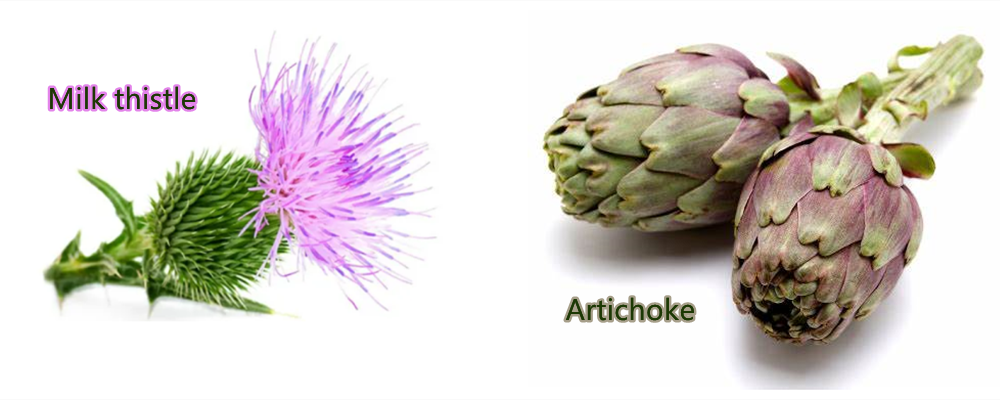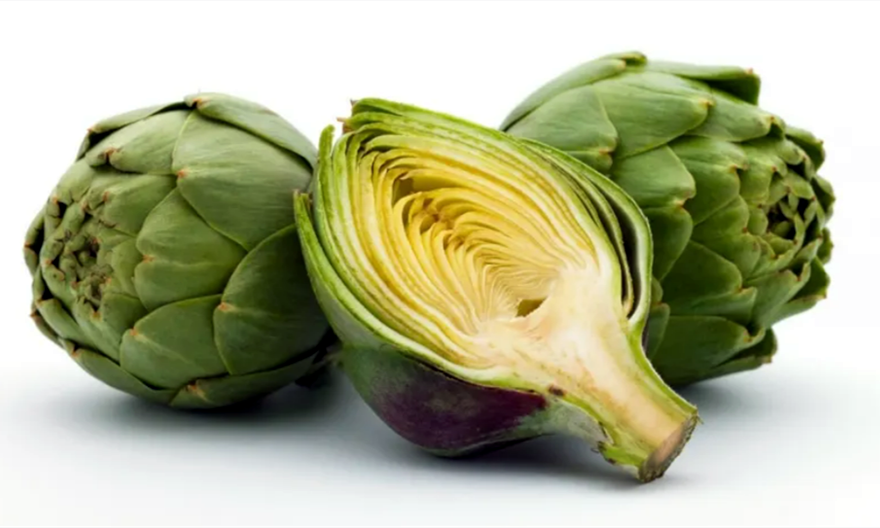Some health products brand produce herb supplements for the liver and some mainly are made of artichoke extract, milk thistle extract and so on, from one source and mixtures, Why? Are artichoke and milk thistle good for the liver? Undoubtedly, They are! In a recent study, researchers from the University of Maryland Medical School found that dietary supplements containing milk thistle and artichoke extract were effective against a variety of liver ailments. In one study, artichoke and milk thistle infusions reduced plasma oxidative stress, improved glucose tolerance, and decreased lipid accumulation in the rat liver. Another study in rats found that milk thistle and artichoke improved the activity of superoxide dismutase (SOD) and malondialdehyde-oxidase (LDL-C) and protected the liver from histological changes. Research also determined the antioxidant activity of the herbal mixture and concluded that artichoke and milk thistle are useful herbs for liver health, preventing and treating diabetes.
Artichoke and milk thistle are related plants. Both contain active substances called silymarin and cynarin. The most well-known function of milk thistle is liver protection. It is used in different liver diseases, especially chronic liver disease, liver cirrhosis and hepatocellular carcinoma, because of its antioxidant, anti-inflammatory and anti-fibrosis effects. Silymarin, natural flavonoid lignans, has the highest silybin content and liver-protecting activity. A standardized milk thistle extract contains at least 80% silymarin. Cynarin supports the liver’s function by facilitating bile production. Bile is essential for the liver detoxification process and carries toxins from the liver into the gut. Milk Thistle, on the other hand, protects liver cells from damage by promoting detoxification. The herb also contains bitter sesquiterpene principles such as grosheimin, cynaratriol, and grosselteimin. If you’re considering taking an artichoke and milk thistle supplement, be sure to follow the label carefully.
Milk thistle and artichoke extracts were used to improve glucose tolerance, biochemical markers of oxidative stress, and insulin resistance in a rat model of nonalcoholic fatty liver disease (NAFLD). The two herbs have also been shown to inhibit the growth of hepatic steatosis, a complication of diabetes. When compared side by side, Artichoke extract and milk thistle had similar phenolic profiles. Artichoke, on the other hand, showed a slightly different profile than milk thistle. This is because the two herbs have different amounts of silymarin, which inhibits its effectiveness and has been associated with liver protection. The herbs also help protect the liver by protecting it from toxins. They protect liver function by promoting the secretion of bile, cholesterol, and vitamin D. While choline is produced by the body, vegans and vegetarians receive much less of it through their food. Artichoke is also an excellent source of choline, which regulates vital body functions. In a recent study, researchers showed that milk thistle and artichoke extract significantly reduced levels of TG, LDL-C, and total cholesterol. In addition, milk thistle reduced the activity of aspartate aminotransferase and protected the liver from histological changes. However, the results of these two herbal remedies were inconsistent, and randomized clinical trials are needed to confirm them.
Artichoke and milk thistle extract are both used to treat digestive disorders. Milk thistle is the most effective herb for liver health. The artichoke leaf extract contains cynarin, a substance that boosts the production of bile in the liver. Bile is a key component in the breakdown of fats and oils in the digestive tract. These herbs may also aid in fighting cancer. This plant contains two antioxidants called silymarin and cynarin. In addition to its benefits for the liver, artichoke is also a valuable source of antioxidants. It has antioxidant properties, helps regenerate new liver cells, and aids detoxification. It also promotes the activity of the superoxide dismutase enzyme and protects the liver from damage.
Both artichoke and milk thistle promotes regular liver function and supports the metabolism of lipids. Besides helping the liver function properly, both artichoke and milk thistle exhibit potent antioxidant and rejuvenating effects on skin cells. Several studies have also shown that artichoke extract and milk thistles may help reduce the effects of cancer treatments, which can lead to the development of cardiovascular disease. While the benefits of these herbs are still in question, they do appear to be worth considering. It has been shown to reduce the risk of bone fractures and may even boost the immune system and reduce the risk of cancer, especially in cases where the disease is advanced.
- Dandelion Extract: What It Is, Benefits, Uses and Side Effect - April 23, 2024
- Is Berberine Extract Help For Weight Loss? - April 11, 2024
- Why Is Pysllium Husk Powder A Popular Meal Replacement Ingredient? - April 3, 2024




